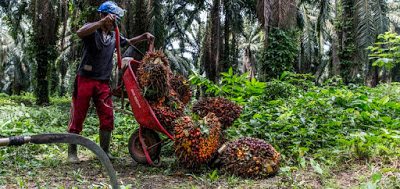Despite public commitments to sustainable palm oil from some of the crop’s largest stakeholders, deforestation continues at a rate of 18 million acres per year, according to the
United Nations, causing some stakeholders to question whether current tactics
to fight the practice are having any effect.
United Nations, causing some stakeholders to question whether current tactics
to fight the practice are having any effect.
Now,15 years after the formation of the Roundtable on Sustainable Palm Oil (RSPO), the leading industry group and largest certifier of sustainably and ethically produced palm oil, new thinking is starting to take hold.
Businesses are realizing certification of supply is a place to start, but it doesn’t necessarily lead to ongoing action by palm oil buyers. A deeper, more localized approach to advocating for change may be key to lasting impact.
Experts from the RSPO, Environmental Defense Fund and other organizations explained
this week at the Responsible Business Summit in Brooklyn, New York, the challenges and strategies to make this notoriously problematic, yet ubiquitous ingredient sustainable at scale.
this week at the Responsible Business Summit in Brooklyn, New York, the challenges and strategies to make this notoriously problematic, yet ubiquitous ingredient sustainable at scale.
Commitment doesn’t always mean action
“A lot of companies have very nice policies that they’re not implementing and they’re not implementing with urgency,” said Daniel Strechay, director of outreach and engagement and U.S. Representative at the RSPO.
Deforestation is still growing, but at a slower rate, said Strechay. Progress is slow in part because many businesses have not yet put their money where their mouth is. The evidence is in the price growers get for palm oil.
Currently, just 62% of certified non-deforestation palm oil receives a premium price in the marketplace, according to Strechay, meaning there is more supply of sustainable oil than demand, causing sellers to lower the price of sustainably produced oil. The argument here is: with the number of major purchasers publicly announcing intentions to rid their supply chains of deforestation, that 62% should be higher.
“That’s a problem,” he said. “That to me says that we have to have a bigger commitment from the downstream to implement these policies.”
“Commitments are great. Commitments don’t always get to action,” added Katie Anderson,
supply chain manager for the Environmental Defense Fund.
supply chain manager for the Environmental Defense Fund.
Certification is only the beginning
“There has been, I think it’s fair to say, a loss of confidence in certification schemes’ ability to actually end deforestation,” said Ethical Corporation editor and discussion moderator Terry Slavin.
“The problem really stems from people viewing the certification as a silver bullet. Certification is a tool in the toolbox you help address these issues,” responded Strechay. He went on to say, “It’s incumbent on companies to work holistically in their supply chain … and not just lean on
certification.”
certification.”
Environmental groups, certifiers and even some big palm oil purchasers have realized in
recent years that making an effort to choose what seems like the most sustainable supply is not enough to actually change the dynamics on the ground in palm oil producing countries.
recent years that making an effort to choose what seems like the most sustainable supply is not enough to actually change the dynamics on the ground in palm oil producing countries.
Issues like farmer compensation and enforcement of local regulations around land use are important elements that simply certifying responsible growers won’t fix.
Rachael Sherman, director of global sustainability for McDonald’s, said the company would like to rely solely on RSPO for its sustainable palm oil monitoring and compliance work, but that’s just not realistic since certification doesn’t necessarily change the deeper systemic issues at work.
Moderns strategies are much more complex
One way corporations are starting to go beyond certification is by collaboratively
working to influence local authorities in what is called the “jurisdictional approach.”
working to influence local authorities in what is called the “jurisdictional approach.”
A simplistic way of describing this growing method of addressing deforestation is to put the certification standards into local legislation on the ground.
The actual work is much more complicated since it requires a deep understanding of local players and dynamics.
This approach said Anderson, “allows companies to be assured that simply sourcing from a certain jurisdiction is enough to assure no deforestation and relieves the burden of continual audits.”
One of a handful of success stories in this vein is Sabah, Malaysia, where roughly 10% of the world’s palm oil is produced. A group of RSPO members, local officials and nonprofits have worked to put sustainable practices into state regulations with the goal of being 100% RSPO certified by 2025.
“Companies are starting to commit to sourcing from Sabah because of that effort
— because they are taking the step to take the jurisdictional approach,” said Strechay. And the benefit goes beyond streamlining supplier approvals for palm oil buyers: growers in Sabah see the value in being a supplier of choice.
— because they are taking the step to take the jurisdictional approach,” said Strechay. And the benefit goes beyond streamlining supplier approvals for palm oil buyers: growers in Sabah see the value in being a supplier of choice.
It’s a longer and rockier road, explained the panel, since governments change, sometimes overnight, personnel shifts continually and stakeholders have often developed grudges over time.
Anderson’s work, mostly in the beef industry in Brazil, is entirely based on this approach, and McDonald’s has three to four pilots across several commodities to see what addressing jurisdictions at a more systemic level can change.
Supply Chain Dive.

































































